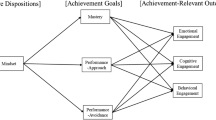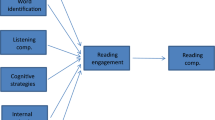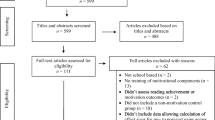Abstract
This longitudinal study examined the development of reading motivation, engagement, and achievement in early adolescence by comparing interrelations of these variables in struggling and advanced readers. Participants were 183 pairs of seventh grade students matched in gender, ethnicity, socioeconomic status, and school attended. They completed measures of reading motivations, engagement and comprehension for information text as well as measures of general reading comprehension and reading fluency twice during the school year. Advanced readers showed stronger relations of motivation and engagement with achievement than struggling readers. However, motivation predicted concurrent engagement and growth in engagement similarly for struggling and advanced readers. These results are interpreted as support for the hypothesis that cognitive challenges limit the relations of motivation and engagement to achievement for struggling readers. The discussion also considers the impact of the focus on the information text genre on the relations observed and implications of the findings for achievement motivation theories.
Similar content being viewed by others
References
American Psychological Association. (2010). Publication manual of the American Psychological Association. Washington, DC: APA.
Baker, L., & Wigfield, A. (1999). Dimensions of children’s motivation for reading and their relations to reading activity and reading achievement. Reading Research Quarterly, 34, 452–477. doi:10.1598/RRQ.34.4.4.
Bandura, A. (1997). Self-efficacy: The exercise of control. New York: W. H. Freeman.
Becker, M., McElvany, N., & Kortenbruck, M. (2010). Intrinsic and extrinsic reading motivation as predictors of reading literacy: A longitudinal study. Journal of Educational Psychology, 102, 773–785. doi:10.1037/a002008.
Chapman, J. W., & Tunmer, W. E. (1995). Development of young children’s reading self-concepts: An examination of emerging subcomponents and their relationship with reading achievement. Journal of Educational Psychology, 87, 154–167. doi:10.1037/0022-0663.87.1.154.
Christensen, S. L., Reschly, A. L., & Wylie, C. (Eds.). (2012). Handbook of research on student engagement. New York: Springer Science. doi:10.1007/978-1-4614-2018-7.
Crocker, L., & Algina, J. (1986). Introduction to classical and modern test theory. New York: Holt, Rinehart, and Winston.
Eccles, J. S., & Wang, M. (2012). Part I commentary: So what is student engagement anyway? In S. L. Christenson, A. L. Reschly, & C. Wylie (Eds.), Handbook of research on student engagement (pp. 133–145). New York: Springer Science. doi:10.1007/978-1-4614-2018-7_6.
Eccles, J. S., & Wigfield, A. (2002). Motivational beliefs, values, and goals. Annual Review of Psychology, 53, 109–132. doi:10.1146/annurev.psych.53.100901.135153.
Frazier, P. A., Tix, A. P., & Barron, K. E. (2004). Testing moderator and mediator effects in counseling psychology research. Journal of Counseling Psychology, 51, 115–134. doi:10.1037/0022-0167.51.1.115.
Fredricks, J. A., Blumenfeld, P. C., & Paris, A. H. (2004). School engagement: Potential of the concept, state of the evidence. Review of Educational Research, 74, 59–109. doi:10.3102/00346543074001059.
Furrer, C., & Skinner, E. (2003). Sense of relatedness as a factor in children’s academic engagement and performance. Journal of Educational Psychology, 95, 148–162. doi:10.1037/0022-0663.95.1.148.
Gottfried, A. E. (1990). Academic intrinsic motivation in young elementary school children. Journal of Educational Psychology, 82, 525–538. doi:10.1037/0022-0663.82.3.525.
Guthrie, J. T., Wigfield, A., & Klauda, S. L. (2012a). Adolescents’ engagement in academic literacy (Report No. 7). University of Maryland, College Park. Retrieved from http://www.corilearning.com/research-publications.
Guthrie, J. T., Wigfield, A., & You, W. (2012b). Instructional contexts for engagement and achievement in reading. In S. L. Christensen, A. L. Reschly, & C. Wylie (Eds.), Handbook of research on student engagement (pp. 601–634). New York: Springer Science. doi:10.1007/978-1-4614-2018-7_29.
Guthrie, J. T., & Ho, A. N. (2013). Patterns of association among multiple motivations and aspects of achievement in reading. Reading Psychology, 34, 101–147.
Guthrie, J. T., Ho, A. N., & Klauda, S. L. (2013). Modeling the relationships among reading instruction, motivation, engagement, and achievement for adolescents. Reading Research Quarterly, 48, 9–26.
Hannon, B., & Daneman, M. (2001). A new tool for measuring and understanding individual differences in the component processes of reading comprehension. Journal of Educational Psychology, 93, 103–128. doi:10.1037/0022-0663.93.1.103.
Johnson, K. M. (2005). Review of the Gates-MacGinitie Reading Tests, Fourth Edition, Forms S and T. In R. A. Spies & B. S. Plake (Eds.), The sixteenth mental measurements yearbook [electronic version]. Retrieved from EBSCOhost Mental Measurements Yearbook database.
Klauda, S. L., & Guthrie, J. T. (2008). Relationships of three components of reading fluency to reading comprehension. Journal of Educational Psychology, 100, 310–321.
Kintsch, W., & Kintsch, E. (2005). Comprehension. In S. G. Paris & S. A. Stahl (Eds.), Children’s reading comprehension and assessment (pp. 71–92). Mahwah, NJ: Erlbaum.
Kuhn, M. R., & Stahl, S. A. (2003). Fluency: A review of developmental and remedial practices. Journal of Educational Psychology, 95, 3–21. doi:10.1037/0022-0663.95.1.3.
Lee, J., & Zentall, S. S. (2012). Reading motivational differences among groups: Reading disability (RD), attention deficit hyperactivity disorder (ADHD), RD + ADHD, and typical comparison. Learning and Individual Differences, 22, 778–785. doi:10.1016/j.lindif.2012.05.010.
Legault, L., Green-Demers, I., & Pelletier, L. (2006). Why do high school students lack motivation in the classroom? Toward an understanding of academic amotivation and the role of social support. Journal of Educational Psychology, 98, 567–582. doi:10.1037/0022-0663.98.3.567.
Livingston, S. A. (2004). Equating test scores (without IRT). Princeton, NJ: Educational Testing Service.
Logan, S., Medford, E., & Hughes, N. (2011). The importance of intrinsic motivation for high and low ability readers’ reading comprehension performance. Learning and Individual Differences, 21, 124–128. doi:10.1016/j.lindif.2010.09.011.
MacGinitie, W. H., MacGinitie, R. K., Maria, K., & Dreyer, L. G. (2000a). Gates-MacGinitie reading tests (4th ed.). Itasca, IL: Riverside.
MacGinitie, W. H., MacGinitie, R. K., Maria, K., & Dreyer, L. G. (2000b). Gates-MacGinitie reading tests: Directions for administration (4th ed.). Itasca, IL: Riverside.
McGrew, K. S., Schrank, F. A., & Woodcock, R. W. (2007). Woodcock-Johnson III normative update technical manual. Rolling Meadows, IL: Riverside.
McInerney, D. M., Dowson, M., & Yeung, A. S. (2005). Facilitating conditions for school motivation: Construct validity and applicability. Educational and Psychological Measurement, 65, 1046–1066. doi:10.1177/0013164405278561.
Meece, J. L., & Miller, S. D. (2001). Longitudinal analysis of elementary school students’ achievement goals in literacy activities. Contemporary Educational Psychology, 26, 454–480. doi:10.1006/ceps.2000.1071.
Mol, S., & Bus, A. (2011). To read or not to read: A meta-analysis of print exposure from infancy to early adulthood. Psychological Bulletin, 137, 267–296. doi:10.1037/a0021890.
Morgan, P. L., & Fuchs, D. (2007). Is there a bidirectional relationship between children’s reading skills and reading motivation? Exceptional Children, 73, 165–183.
National Center for Education Statistics. (2011). The nation’s report card: Reading 2011 (NCES 2012–457). Washington, DC: National Center for Education Statistics, Institute of Education Sciences, U.S. Department of Education.
Nippold, M. A., Duthie, J. K., & Larsen, J. (2005). Literacy as a leisure activity: Free-time preferences of older children and young adolescents. Language, Speech, and Hearing Services in Schools, 36, 93–102. doi:10.1044/0161-1461(2005/009.
Reeve, J. (2012). A self-determination theory perspective on student engagement. In S. L. Christensen, A. L. Reschly, & C. Wylie (Eds.), Handbook of research on student engagement (pp. 149–173). New York: Springer Science. doi:10.1007/978-1-4614-2018-7_7.
Retelsdorf, J., Koller, O., & Moller, J. (2011). On the effects of motivation on reading performance growth in secondary school. Learning and Instruction, 21, 550–559. doi:10.1016/j.learninstruc.2010.11.001.
Ryan, R. M., & Deci, E. L. (2000). Self-determination theory and the facilitation of intrinsic motivation, social development, and well-being. American Psychologist, 55, 68–78. doi:10.1037/0003-066X.55.1.68.
Saarnio, D. A., Oka, E. R., & Paris, S. G. (1990). Developmental predictors of children’s reading comprehension. In T. H. Carr & B. A. Levy (Eds.), Reading and its development: Component skills approaches (pp. 57–79). San Diego, CA: Academic Press.
Schrank, F. A., Mather, N., & Woodcock, R. W. (2004). Woodcock-Johnson III diagnostic reading battery comprehensive manual. Itasca, IL: Riverside.
Sideridis, G., Mouzaki, A., Simos, P., & Protopapas, A. (2006). Classification of students with reading comprehension difficulties: The roles of motivation, affect, and psychopathology. Learning Disability Quarterly, 29, 159–180. doi:10.2307/30035505.
Skinner, E. A., & Pitzer, J. (2012). Developmental dynamics of student engagement, coping, and everyday resilience. In S. L. Christensen, A. L. Reschly, & C. Wylie (Eds.), Handbook of research on student engagement (pp. 21–45). New York: Springer Science. doi:10.1007/978-1-4614-2018-7_2.
Solheim, O. J. (2011). The impact of reading self-efficacy and task value on reading comprehension scores in different item formats. Reading Psychology, 32, 1–27. doi:10.1080/02702710903256601.
Tabachnick, B. G., & Fidell, L. S. (2007). Using multivariate statistics (5th ed.). Boston: Allyn and Bacon.
Taboada, A., Tonks, S. M., Wigfield, A., & Guthrie, J. (2009). Effects of motivational and cognitive variables on reading comprehension. Reading and Writing: An Interdisciplinary Journal, 22, 85–106.
Trautwein, U., Lüdtke, O., Schnyder, I., & Niggli, A. (2006). Predicting homework effort: Support for a domain-specific, multilevel homework model. Journal of Educational Psychology, 98, 438–456. doi:10.1037/0022-0663.98.2.438.
van den Broek, P., Virtue, S., Everson, M. G., Tzeng, Y. T., & Sung, Y. (2002). Comprehension and memory of science texts: Inferential processes and the construction of a mental representation. In J. Otero, J. A. Leon, & A. C. Graesser (Eds.), The psychology of science text comprehension (pp. 131–154). Mahwah, NJ: Erlbaum.
Wentzel, K. R. (1996). Social goals and social relationships as motivators of school adjustment. In J. Juvonen & K. R. Wentzel (Eds.), Social motivation: Understanding children’s school adjustment (pp. 226–247). New York: Cambridge University Press. doi:10.1017/CBO9780511571190.012.
Wigfield, A., & Cambria, J. (2010). Children’s achievement values, goal orientations, and interest: Definitions, development, and relations to achievement outcomes. Developmental Review, 35, 1–30.
Woodcock, R. W., Schrank, F. A., Mather, N., & McGrew, K. S. (2007). Woodcock-Johnson III tests of achievement, form C/brief battery. Rolling Meadows, IL: Riverside Publishing.
Acknowledgments
The research described herein was supported by Grant R01HD052590 from the National Institute of Child Health and Human Development awarded to John T. Guthrie.
Author information
Authors and Affiliations
Corresponding author
Rights and permissions
About this article
Cite this article
Klauda, S.L., Guthrie, J.T. Comparing relations of motivation, engagement, and achievement among struggling and advanced adolescent readers. Read Writ 28, 239–269 (2015). https://doi.org/10.1007/s11145-014-9523-2
Published:
Issue Date:
DOI: https://doi.org/10.1007/s11145-014-9523-2




